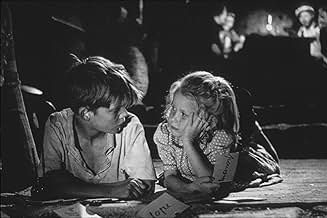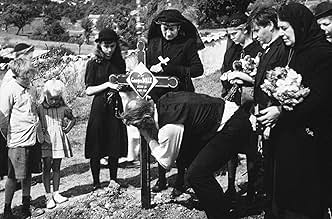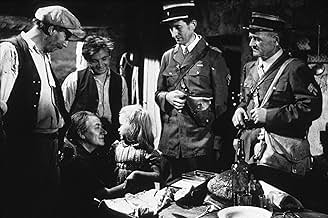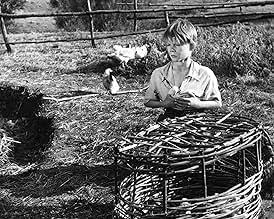Jeux interdits
- 1952
- Tous publics
- 1h 26min
NOTE IMDb
8,0/10
14 k
MA NOTE
Une jeune française devenue orpheline après un raid aérien nazi devient amie avec le fils d'un fermier pauvre. Ensemble, ils tentent d'accepter les réalités de la mort.Une jeune française devenue orpheline après un raid aérien nazi devient amie avec le fils d'un fermier pauvre. Ensemble, ils tentent d'accepter les réalités de la mort.Une jeune française devenue orpheline après un raid aérien nazi devient amie avec le fils d'un fermier pauvre. Ensemble, ils tentent d'accepter les réalités de la mort.
- Réalisation
- Scénario
- Casting principal
- Nommé pour 1 Oscar
- 8 victoires et 2 nominations au total
Marcel Mérovée
- Raymond Dollé
- (as Pierre Merovée)
Denise Péronne
- Jeanne Gouard
- (as Denise Perronne)
Marie-Pierre Casey
- Infirmière
- (non crédité)
André Enard
- Le premier gendarme
- (non crédité)
Marcelle Feuillade
- La mère de Paulette
- (non crédité)
Roger Fossey
- Le père de Paulette
- (non crédité)
Avis à la une
10jonr-3
I don't know why I never managed to see "Les Jeux interdits" until tonight, an August evening in 2003, more than a half-century after the film's release. I'd heard about it ever since I started studying French in college in 1958.
The amount of comedy in the film surprised and pleased me. I'd always had the impression the film was morbid and creepy. I didn't find it so; poignant, occasionally disturbing, even heart-wrenching, but not morbid at all. The acting by the two children playing Michel and Paulette is the most amazing pair of performances I've ever seen. I learned from postings here that the film was made under far less than optimal conditions, but the flaws that do show up in the film, chief among them the abrupt and unsatisfactory ending, are so negligible in contrast to the overwhelming emotional and acting values throughout, that I rated this film a ten, the first time I've reached for the highest number.
I cannot imagine anything finer than this film, whose images will probably haunt me for the rest of my life.
The amount of comedy in the film surprised and pleased me. I'd always had the impression the film was morbid and creepy. I didn't find it so; poignant, occasionally disturbing, even heart-wrenching, but not morbid at all. The acting by the two children playing Michel and Paulette is the most amazing pair of performances I've ever seen. I learned from postings here that the film was made under far less than optimal conditions, but the flaws that do show up in the film, chief among them the abrupt and unsatisfactory ending, are so negligible in contrast to the overwhelming emotional and acting values throughout, that I rated this film a ten, the first time I've reached for the highest number.
I cannot imagine anything finer than this film, whose images will probably haunt me for the rest of my life.
This great film has been well-described here and elsewhere, and I don't know that there's a lot more to be said about its worth. It made a great impression on me when I first saw it in an English-dubbed version on late night TV many years ago, and it has always been a favorite of mine since then.
But it seems there's often a bit more to learn about an old favorite film. In this case, I acquired a foreign DVD edition of "Les Jeux interdits" which contained, besides some interesting outtakes, a later-deleted prologue and epilogue to the film which I had never heard of before. These did not have English subtitles, so I had to guess what was being said, but Clement's direction and the acting of young Fossey and Poujouly are so good that I could follow almost all of it without knowing very much French at all. They establish a sort of framing device for the story, in that the plot of the film is in fact a story from a book being read by the boy to the girl. In the prologue we see Fossey and Poujouly, not dressed in grimy peasant clothes at all, but clean, scrubbed, and in their Sunday-best, sitting on a log over a stream. The boy begins reading the story of Paulette and Michel out of the book, and we fade into the film as we now know it, beginning with the refugees on the road. After the sad ending of the story, we fade back to the epilogue, where the boy has just finished reading. The heartbreaking ending of the story has the girl in tears of despair. So the boy, in an act of kindness to her, pretends to read a blank page at the end of the book and makes up a happy ending to the story to dispel her grief.
I guess I can see why it might have been deleted later, as it tends to soften the force of the central narrative a bit and the devastating sadness of its ending. But it really is a beautiful and touching bit of film, and I'm very happy to have a chance to see it, as I don't think it's been seen much over the years, or that many fans of this film are even aware of it.
The outtakes are quite interesting as well, as they show some alternate takes of familiar scenes, including the snapping of that little blackboard thing with the title of the film at the start of the shots (what's that thing called, anyway?). There is also some footage of the old owl in the rafters of the mill, in which you can occasionally see Clement coming into the frame to turn the owl's head around toward the camera when it keeps turning away.
With or without the missing prologue and epilogue this is a great masterpiece that you should experience.
But it seems there's often a bit more to learn about an old favorite film. In this case, I acquired a foreign DVD edition of "Les Jeux interdits" which contained, besides some interesting outtakes, a later-deleted prologue and epilogue to the film which I had never heard of before. These did not have English subtitles, so I had to guess what was being said, but Clement's direction and the acting of young Fossey and Poujouly are so good that I could follow almost all of it without knowing very much French at all. They establish a sort of framing device for the story, in that the plot of the film is in fact a story from a book being read by the boy to the girl. In the prologue we see Fossey and Poujouly, not dressed in grimy peasant clothes at all, but clean, scrubbed, and in their Sunday-best, sitting on a log over a stream. The boy begins reading the story of Paulette and Michel out of the book, and we fade into the film as we now know it, beginning with the refugees on the road. After the sad ending of the story, we fade back to the epilogue, where the boy has just finished reading. The heartbreaking ending of the story has the girl in tears of despair. So the boy, in an act of kindness to her, pretends to read a blank page at the end of the book and makes up a happy ending to the story to dispel her grief.
I guess I can see why it might have been deleted later, as it tends to soften the force of the central narrative a bit and the devastating sadness of its ending. But it really is a beautiful and touching bit of film, and I'm very happy to have a chance to see it, as I don't think it's been seen much over the years, or that many fans of this film are even aware of it.
The outtakes are quite interesting as well, as they show some alternate takes of familiar scenes, including the snapping of that little blackboard thing with the title of the film at the start of the shots (what's that thing called, anyway?). There is also some footage of the old owl in the rafters of the mill, in which you can occasionally see Clement coming into the frame to turn the owl's head around toward the camera when it keeps turning away.
With or without the missing prologue and epilogue this is a great masterpiece that you should experience.
A classic French foreign film, one of the best. A necessity for every foreign film lover's video library, along with Cinema Paradiso and Life Is Beautiful. This film haunts you and stays with you long after the film flashes its "finis". Part of this is due to the musical soundtrack, with its romantic guitar melodies, part of it has to do with the sadness of the storyline....the little girl's losing her parents and beloved dog early in the picture, but mostly the film lingers in your heart because of the outstanding performances by the child actors in this film, Georges Poujouly who plays Michel, and especially Brigitte Fossey as Paulette. Her little innocent face expresses all the horrors and trauma of war, what all the millions of children must have felt who were caught up in the barbarism of World War Two, when the security of a loving home was pulled out from under them. Never has the agony of a human being's suffering been so well captured on film, and I think Brigitte was all of six years old when she performed in this movie. A remarkable feat.
Never has the world of adults seemed so utterly stupid, brutal and senseless than through the eyes of two innocent children who have to deal with pain, loss, death and war. And yet, the film is gentle, subtle, inobtrusive in its portrayal of the grown-up's follies, and refreshingly unsentimental about presenting the pain and beauty of childhood.
A masterpiece.
Few other titles come to mind in which child actors have so much to bear, and they manage it effortlessly & unforgettably.
[The only thing that bothers me is the too convincing 'acting' of the dead /?/ dog...]
A masterpiece.
Few other titles come to mind in which child actors have so much to bear, and they manage it effortlessly & unforgettably.
[The only thing that bothers me is the too convincing 'acting' of the dead /?/ dog...]
The first thing to bear in mind is that "Jeux interdits" was first a short ,part of a film made up of sketches -two others were to be made.For financial reasons,they were eventually jettisoned ,and "jeux interdits" had to be fleshed out to the proportions of a feature-length film.So additional scenes were shot more than one year after the first ones...and of course the children had grown up! Clement and his team had to make wonders to hide that.And they outdid themselves so brilliantly that nobody saw their "effects".
Now for the ending:Clement wanted a prologue and an epilogue:Fossey and Poujouly would read a book which told the tale of two children (Paulette and Michel).Those short sequences were eventually withdrawn,which explains this unexpected ending which still baffles the audience today.
As for the movie,needless to say it's one of the most important works of the French cinema.Some users did comment it so well I won't add anything except for Brigitte Fossey's performance,which will remain the most powerful one for such a young child.It was not surprising that Fossey enjoyed a brilliant career when she grew up...even if she never found a part so striking afterward.
Now for the ending:Clement wanted a prologue and an epilogue:Fossey and Poujouly would read a book which told the tale of two children (Paulette and Michel).Those short sequences were eventually withdrawn,which explains this unexpected ending which still baffles the audience today.
As for the movie,needless to say it's one of the most important works of the French cinema.Some users did comment it so well I won't add anything except for Brigitte Fossey's performance,which will remain the most powerful one for such a young child.It was not surprising that Fossey enjoyed a brilliant career when she grew up...even if she never found a part so striking afterward.
Le saviez-vous
- AnecdotesIn a television interview ("Vivement Dimanche Prochain", France 2, 17 April 2005) Brigitte Fossey, who played the little Paulette, revealed that the film had originally been shot as a short, and then it was later decided to extend it into a feature film. Unfortunately she had lost her milk teeth and Georges Poujouly (who plays the boy Michel) had had his hair cut to play in Nous sommes tous des assassins (1952). So, in many scenes of the movie Paulette has false teeth and Michel is wearing a wig.
- GaffesThe poor parents are killed by a Focke-Wulf 190. This kind of plane didn't exist at the moment of the "battle of France" in May and June 1940.
- Crédits fousThere are two alternate opening credits:The main credit starts with a story book and a female hand opens the book to reveal the credits. The alternate still has the same book but this time we are introduced to the two main characters who are sitting by a lake. In this version, Michel's hand is turning the page and in between the scenes he tells Paulette that he's going to tell a story.
- ConnexionsFeatured in Le ciné-club de Radio-Canada: Film présenté: Jeux interdits (1959)
Meilleurs choix
Connectez-vous pour évaluer et suivre la liste de favoris afin de recevoir des recommandations personnalisées
- How long is Forbidden Games?Alimenté par Alexa
Détails
- Date de sortie
- Pays d’origine
- Site officiel
- Langue
- Aussi connu sous le nom de
- Croix en Bois, Croix en Fer
- Lieux de tournage
- Sociétés de production
- Voir plus de crédits d'entreprise sur IMDbPro
Box-office
- Montant brut aux États-Unis et au Canada
- 33 284 $US
- Week-end de sortie aux États-Unis et au Canada
- 4 316 $US
- 26 avr. 2015
- Montant brut mondial
- 33 897 $US
- Durée1 heure 26 minutes
- Couleur
- Rapport de forme
- 1.37 : 1
Contribuer à cette page
Suggérer une modification ou ajouter du contenu manquant

Lacune principale
By what name was Jeux interdits (1952) officially released in India in English?
Répondre


























